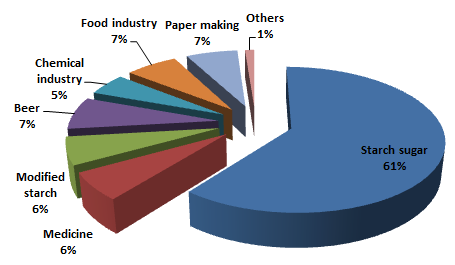Starch & Starch Derivatives Exhibition: Overview of China’s starch industry
Keyword:
Publish time:
13th June, 2017
Source:
CCM
Information collection and data processing: CCM
For more information, please
contact us
On
June 20 to 22, Shanghai will host the China International Starch and Starch
Derivatives Exhibition. This event, which takes place annually, is the only
professional starch trade fair in Asia. The exhibition in 2017 will be the
twelve time of Shanghai welcoming experts and professionals from all over the
world in the starch industry to grab their chances in China's fast-growing
starch market.

The
profile of China's starch event will cover the segments of starch, modified
starch, sugar&KeyWordID=1ccb34a5a61a4432beeac3010e1fbde9&PublisherID=b3fac7dd-9156-424c-9843-193631ebb67b' target='_blank'>starch sugar, fermentation products, starch derivates, and raw
materials for starch. Furthermore, the 2017 Global Starch Industry
Conference is going to take place as part of the event, which will focus
on the latest applications of starch and bio-based materials. After all, bio-based
materials are a worldwide focus of new materials, as well as an important field
of China's strategic emerging materials industry and biomass industry.
Developing environmentally-friendly and recyclable bio-based materials with
rich biological resources is of great significance to replacing fossil
resources, developing the cyclic economy, and building a resource-conserving
and environmentally friendly society.
Market
intelligence firm CCM gives an overview of the starch industry in China to
prepare attendees for the game-changing event in Shanghai. Make an appointment
with Kcomber, the parent company of CCM, at the exhibition by contacting econtact@cnchemicals.com.
Downstream
sectors of the starch industry by consumption of starch in China, Jan.-Nov.
2016

Source:
China Starch Industry Association
Corn starch
China's corn starch demand normally remains weak in the period of March to September
and starts to meet a peak period in October. Therefore, it is predicted that
corn starch price is less likely to rise significantly in the coming period,
due to the weak demand.
Notably,
the corn starch industry has been suffered from oversupply for a long time.
Corn starch output is likely to reach about 24.50 million tonnes in 2017, while
the demand might settle around 23.50 million tonnes. Furthermore, the growth of
output will even exceed the one of demand.
Besides,
corn starch still actively expanded production capacity. In 2017, many corn
deep processing companies increased capacity, with a combined rise of 10.70
million t/a, about 7.50 million tonnes of corn starch, according to the CSIA.
Nevertheless, constructing production lines in a short time means short
processing lines, which will result in structural overcapacity, a high degree
of similarity and low added value of products. CCM predicts that the corn
starch industry will still see overcapacity for a long time, especially with
the government's subsidy policy.
In
general, corn starch price fluctuates with the corn price. However, although
corn price continued rising in May in China, the corn starch price declined.
According to CCM's price monitoring, as of 13 May, the ex-works price of corn
starch amounted to USD298.60/t
SG
China's SG industry has faced significant integration in recent years. For example,
several domestic producers have expanded their capacities to seize larger
market shares and others have completely stopped their production because of
the environmental issue and fierce competition in the market. However, with the
entrances and exits of some players, the major producers of SG in China remain
concentrated in Shandong Province.
The
output of SG in China kept increasing in the past 5 years due to the positive
demand domestically as well as overseas. The prices of corn and corn starch
kept decreasing from 2015 to 2016, which benefited the corn processing industry
as well. In 2016, the output of SG in China reached 629,000 tonnes with a CAGR
of 7.59% from 2012 to 2016.
The
export of China's SG has been a rapid growth during 2012–2016. Stimulated by
overcapacity and fierce competition in the domestic market, China's SG
producers have paid more attention to the expansion of the overseas market,
while the low-price level of SG also beneficial for their business expansion.
Asia is still the major export destination of China's SG.
Concrete
additive, water quality steadying agent, food and electroplating detergent are
the major downstream products of SG in China. SG is mostly used in industrial
fields. Nearly 90% of SG is consumed in concrete additive. Benefited
from the increasing investment in infrastructure and real estate, the output of
commodity concrete in China increased year by year, creating a greater demand
for SG from 2012 to 2016.
Modified food starch
In
China, dairy products, as well as sauces, are the top end use application
fields of modified food starch, accounting for about three-quarters of the
total modified food starch sales volume by manufacturing giant Ingredion, in
2014 and 2015.
To
be more precise, dairy products used about 41,500 tonnes of modified food starch
in China in 2015, taking up 7.43% of the national total consumption. Dairy
products using modified food starch include yoghurt, milk beverage, and cheese.
Because of competition from overseas market, the output growth of China's dairy
products has been quite slow during 2013~2015 with a CAGR of only 1%. The
output in 2014 even dropped slightly over that in 2013.
The
largest consumption field of modified food starch in China have been noodles,
accounting for more than 38% of the consumption in 2015. Following have been
meat products with around 14% and candy with almost 11% of share. Other notable
consumption fields have been snack food, frozen food, dairy, and seasoning
paste.
Starch sugar
The
past two years has seen declining profits for China's starch sugar industry.
Firstly, competition among starch sugar enterprises was fierce, and secondly,
it is difficult to either market high value-added products or earn profits,
as prices of raw materials are low. To sum up, the starch sugar industry in China
is barely profitable now.
The
number of starch sugar enterprises in China has fallen from over 120 to only
107. Of the remaining enterprises. Moreover, industrial integration has taken
place in China's starch industry, contributing to the development of the market
and increasing industry concentration. That is to say, medium- and small-sized
starch sugar producers are gradually being replaced by large-sized ones;
outmoded capacity and enterprises which pollute the environment are to be
gradually eliminated.
Starch
sugar is mainly used in the food industry, especially in the beverage and
pastry industries. Given that the cane sugar price remains high and the starch
sugar price is low at present, replacing cane sugar with starch sugar seems the
more sensible choice. However, according to CCM's research, as of the end of
March, the sales/production ratio for sugar was 43.2%, vs. 40.3% in the same
period in 2015/16, which indicates that demand for starch sugar might be
sluggish in the future.
Recently,
researchers were substituting corn starch sugar for sugar to make ice cream. In
the last 6 months, the purchase price of sugar increased from USD738.18/t to
near USD1,033.45/t. In the meantime, the price of starch sugar declined from
USD354.32/t to USD295.27/t, due to the falling corn price. However, the
sweetness of starch sugar is not as high as sugar. The related person
also revealed that the cost of sugar takes up a large part of ice cream
production costs, and using starch sugar to replace sugar can reduce 35% of
production costs.
About CCM
CCM
is the leading market intelligence provider for China's agriculture, chemicals,
food & ingredients and life science markets.
Do
you want to find out more about the starch market in China? Try our Newsletters and Industrial Reports or join our professional online platform today and get
insights in Reports, Newsletter, and Market Data at one place.
For
more trade information of starch products, including Import and Export analysis
as well as Manufacturer to Buyer Tracking, contact our experts in trade
analysis to get your answers today.
Meet
Kcomber at the exhibition on June 20 – 22. Please contact mailto:econtact@tranalysis.com.com for making an appointment.